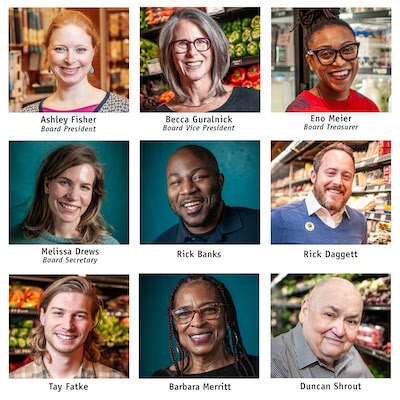Participation: A Key Cooperative Advantage

Cooperatives are different from other forms of business, and participation by owners is a significant benefit of the cooperative model. Two of the seven cooperative principles — democratic member control and member economic participation — allude to the importance of participation in the cooperative form of enterprise. According to Dame Pauline Green of the International Cooperative Alliance (www.ica.coop), participation is a part of “cooperative DNA,” and is the thing that most clearly differentiates co-ops from other forms of business. 
Just what, exactly, does owner participation mean in the cooperative world? Until recent years, volunteering was the most commonly recognized form of participation by owners. However, advancements in cooperative policies and processes, such as the realization that cooperatives function far more efficiently with paid staff and can be important sources of employment in the communities that they serve, have all but eliminated volunteer opportunities for stocking shelves and ringing up customers. In cooperatives today, participation takes other forms.
Marilyn Scholl of CDS Consulting Cooperative has articulated several forms of cooperative participation by owners, a “cooperative hierarchy of needs.” These include: use; own; serve: and belong.
Use
This is perhaps the most universal form of participation, and is in fact not limited to owners. Anyone can use the co-op, and use is a very important form of participation. Use includes:
- Shopping
- Dining
- Attending workshops
- Having a drink on the patio
Own
Ownership is also a critical form of participation – cooperatives simply cannot exist without owners. For $25 annually or $200 for a full fair share, Outpost owners:
- Provide working capital for the cooperative
- Receive dividends (patronage rebates) in proportion to their purchases when the cooperative is profitable
- Receive special pricing on local items and weekly sale items
- Create community capital
- Elect the Board of Directors
- Are eligible for owner loan and class 2 stock programs
Serve
At a recent retreat, board and management discussed the various forms that service can take at Outpost. Here's what we came up with:
- Running for a seat/serving on the Board of Directors
- Voting in the board election
- Attending the annual meeting
- Working at Outpost
- Spreading the love for Outpost among friends, family, and neighbors
- Sharing ideas and opinions with management and board
- Buying someone in the community an Outpost ownership
- Lending the cooperative money or purchasing non-voting class 2 shares
Belong
Belonging is perhaps the most difficult to define of the forms of cooperative participation. Belonging is often highly individual - you know it when you see (or feel) it. Belonging might include:
- Identifying with cooperative values and principles
- Feeling welcomed and accepted
- Engaging with the Outpost community
- Feeling separation anxiety when you haven't visited your local Outpost in several days
- Longing for a bowl of Outpost chili or slice of banana bread
Here's an invitation to participate: add a comment on how you use, own, serve or belong. Can you add to this list?
Will Kort – Board President
Comments
Bloggers
Archived Columns
Tags
Archives
-
April 2024 (1)
March 2024 (1)
February 2024 (1)
December 2023 (1)
August 2023 (1)
March 2023 (1)
February 2023 (1)
November 2021 (1)
September 2021 (1)
November 2020 (1)
October 2020 (1)
July 2020 (1)
June 2020 (1)
May 2020 (1)
February 2020 (1)
January 2020 (1)
December 2019 (1)
November 2019 (1)
October 2019 (1)
August 2019 (2)
May 2019 (1)
March 2019 (2)
January 2019 (1)
December 2018 (1)
November 2018 (1)
October 2018 (2)
September 2018 (1)
February 2018 (1)
November 2017 (2)
October 2017 (1)
July 2017 (2)
March 2017 (1)
February 2017 (1)
January 2017 (1)
December 2016 (2)
November 2016 (1)
August 2016 (2)
July 2016 (2)
March 2016 (2)
February 2016 (2)
January 2016 (1)
December 2015 (1)
October 2015 (3)
August 2015 (1)
July 2015 (2)
June 2015 (1)
March 2015 (2)
February 2015 (2)
January 2015 (2)
December 2014 (2)
November 2014 (1)
October 2014 (3)
August 2014 (2)
July 2014 (1)
June 2014 (2)
May 2014 (2)
April 2014 (1)
March 2014 (2)
February 2014 (2)
January 2014 (2)
December 2013 (1)
November 2013 (2)
October 2013 (1)
July 2013 (2)
June 2013 (1)
May 2013 (2)
April 2013 (1)
March 2013 (2)
February 2013 (1)
January 2013 (2)
December 2012 (3)
November 2012 (1)
October 2012 (3)
September 2012 (2)
August 2012 (4)
July 2012 (4)
June 2012 (6)
May 2012 (3)
April 2012 (4)
March 2012 (6)
February 2012 (8)
January 2012 (3)
December 2011 (4)
October 2011 (4)
September 2011 (3)
August 2011 (5)
July 2011 (7)
June 2011 (1)
May 2011 (2)
April 2011 (7)
March 2011 (10)
February 2011 (12)
January 2011 (11)
December 2010 (19)
November 2010 (13)
October 2010 (22)
September 2010 (16)
August 2010 (24)
July 2010 (33)
June 2010 (5)
May 2010 (52)
April 2010 (37)
March 2010 (55)
February 2010 (44)
January 2010 (46)
December 2009 (40)
November 2009 (26)
October 2009 (37)
September 2009 (34)
August 2009 (24)
July 2009 (21)
June 2009 (29)
May 2009 (30)
April 2009 (33)
March 2009 (16)
February 2009 (2)
January 2009 (5)
November 2008 (1)
October 2008 (1)
September 2008 (2)
August 2008 (3)
July 2008 (2)
June 2008 (6)
May 2008 (2)
April 2008 (10)
March 2008 (5)
February 2008 (5)
January 2008 (12)
December 2007 (5)
October 2007 (3)
August 2007 (3)
July 2007 (1)
June 2007 (5)
May 2007 (4)
April 2007 (6)
March 2007 (3)
February 2007 (3)
January 2007 (4)
December 2006 (2)
October 2006 (2)
September 2006 (5)
August 2006 (8)
0 (1)










